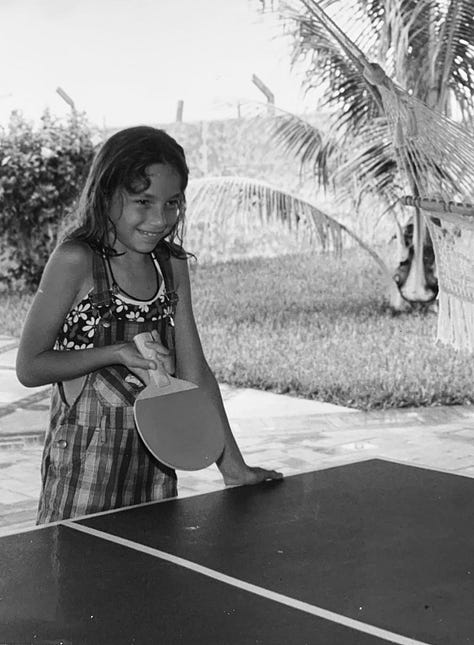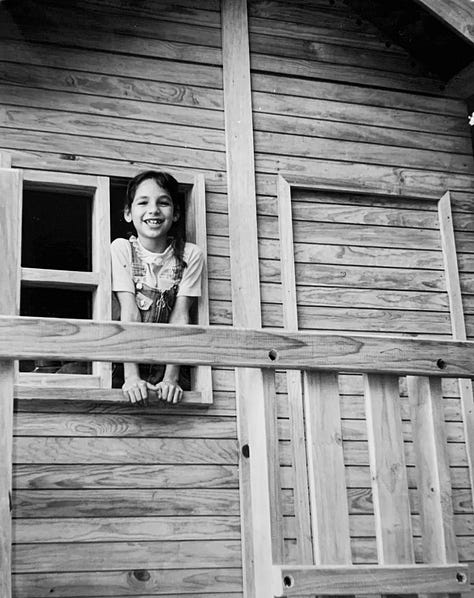No. 11 — Six chronicles of unrelated amusements
A handful of lessons on patience, time, silence, and exploring other identities...
ONE
I slowly peeked through the branches to make sure no one was close. My breathing was fast, uneven... I realized there was a tiny space where I could hide until I was out of danger. I grabbed a cluster of leaves and placed them on top to go unnoticed. I stayed there for what I thought were hours, although it was probably just a few minutes. Then I heard the steps… the crackling of the leaves. The laugh of someone when they’re about to find something. My fear to be found kept me still.
Playing Hide and Seek taught me a lesson or two about resourcefulness, silence, and paying attention…
TWO
It was a challenging track, perhaps the most challenging one I had ever seen before. I was nervous, but at the same time I felt confident (a beautiful contradiction). It was my turn. I took a deep breath and started running as fast as I could. At the time I did not know that whenever I ran at that speed, whenever I felt this shortness of breath, I was becoming stronger. And I was becoming stronger because I was beating the invisible: I was beating the wind. About to finish the race, I got distracted and fell on top of one of the course obstacles. The ambulance arrived a few minutes later, and they sewed up my leg.
A small obstacle race on my backyard taught me that games also give you battle scars.
THREE
I took care of them on my own for four consecutive days. Every morning, I would wake up early, walk towards the forest, cut some leaves along the way, and feed them. I would return with my knees covered in mud and dirt because the small pond was nestled between the mountains, and I had to crouch down very low to reach it. On the fifth day, they all died. My older cousin discovered the cave, and in his usual attempt to show off, he dropped a huge rock onto the pond and killed them all.
I was six. I learned that the world can be a harsh place.
FOUR
It was an ultra-secret mission. First, we tied a rope from balcony to balcony. There was another house in between, but we assumed the neighbors would never notice. On the rope, we placed a lightweight basket. It seemed insignificant, but the basket contained secrets, plans, and ideas, all in an invented language we used to communicate with each other. The secret mission was carried out successfully for months. Until we understood how weight and gravity work. On a windy day, I put a rock on top of the basket to prevent the letters from flying away, and the weight broke it. I watched in slow motion as the rock fell onto the neighbor's car window and smashed it…
Setting up a secret-mail infrastructure with my neighbors revealed that even naïve actions have real consequences.
FIVE
For the first time in my life, my rivals were wearing jerseys from other countries: Puerto Rico, Cuba, Dominican Republic, the United States... Most of my teammates were nervous and scared. Our average height of 1.65 (5.4 ft) made us look insignificant in comparison with the 185’s of the other other teams (6ft tall). Somehow, being against all odds made me feel empowered. For the duration of the match, I stopped being the quiet one and became determined, outgoing, assertive. I dared to take up space. And it was amazing. Probably one of the most incredible sensations I’ve ever felt.
That volleyball match for the Pre-World Qualifiers taught me that when there's nothing to lose, there's a lot to gain.
SIX
The heat was scorching so we walked a few more kilometers towards the river. The water was crystal clear. Frozen cold. Trees that had fallen over the years rested on the surface, extending their branches into the river. Some logs protruded from the edges, like motionless crocodiles, watching us closely… We jumped into the river in the middle of nowhere. The cold water washed away the uncertainty of what was at the bottom. We searched for turtles, climbed a tree, and laughed nervously about that underwater world sitting a few feet below us.
A summer at San Pedro taught me that great adventures begin with curiosity despite of fear.



A few Notes on Play
In his book “The Play of Animals” (1898), Karl Groos proposed that play in animals is a product of natural selection, serving as a mechanism to ensure the practice of essential skills required for survival and reproduction.
Lion cubs and other young predators, for example, play by simulating stalking, pouncing, and chasing, while zebra colts and other prey species engage in play mimicking fleeing and dodging...
This commonly accepted "practice theory of play" is widely acknowledged by contemporary researchers. It explains the reasons why young animals engage in more play compared to their older counterparts (due to their greater learning needs). It also clarifies that animals relying less on instinctual behaviors for survival, and more on learning, tend to engage in more play.
Groos followed The Play of Animals with a second book, The Play of Man (1901), in which he extended his insights about animal play to humans and concluded that humans, having much more to learn than other species, are the most playful of all animals.
It seems then, that whether it’s Hide and Seek, a volleyball game, or a secret agent’s mission, child-like play is fundamentally about learning. And if Groos’s theory is correct, it is about learning skills that will come in handy within our own culture and world…



